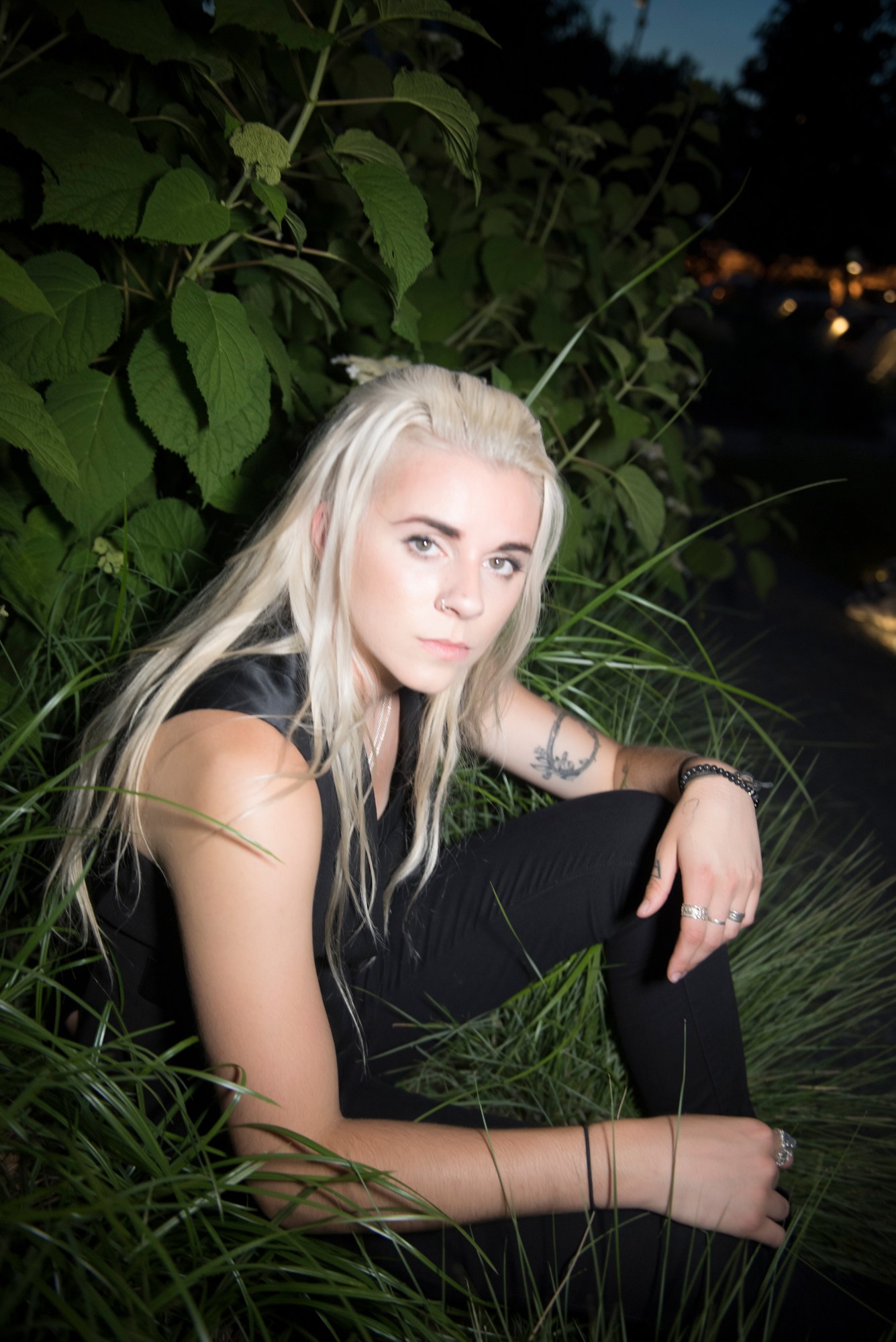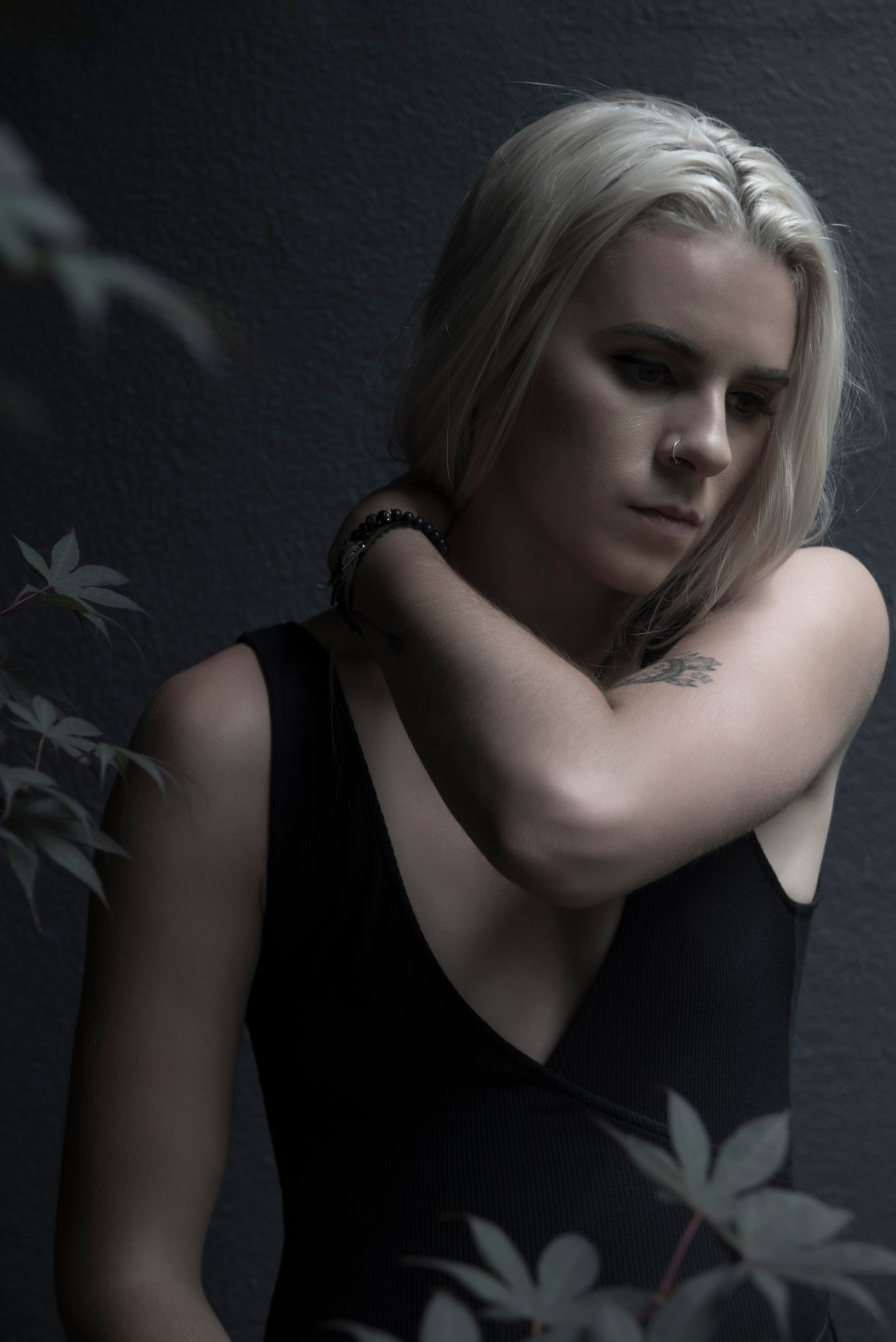Lynn Gunn is trying to decide what drink to order. She’s one week into a self-enforced ban on coffee, so that’s out of the running. “I’m generally really anxious, so I’m seeing how I do without it.” She thinks for a moment. “A drink drink?” she says slowly, before quickly rescinding the suggestion. It’s 10.40am in London. Her body clock is still on US time.
Gunn has spent most of the past three years in this mind set – rushing from place to place, time-zone to time-zone, trying to catch up with herself. In 2014, after Pvris became the first female-led act to sign to Rise Records, the band released their debut album, White Noise. It combined their metalcore roots with a fondness for electronic pop, and found, in that strange middle ground, an unexpected potency. They secured a place in the upper echelons of the music scene seemingly overnight, joining Bring Me the Horizon and Fall Out Boy on stadium tours, performing on Jimmy Kimmel, and winning some variation of Best Newcomer at a handful of awards ceremonies. Their music’s anthemic sweep, its dramatic untangling of heartache, earned them a ferociously enthusiastic young fan base, the kind of fan base who would propose at their shows, and – taking Gunn’s openness about her own sexuality as inspiration – come out to their parents at signings. But Gunn couldn’t keep up with it.
“There was so much stress and so much pressure literally every single day, pretty much non-stop, for three years,” she says, sipping on the tea she eventually settled for. We’re in a hotel in Shepherd’s Bush, because it’s close to BBC’s Maida Vale studios, where later today they’ll cover Brand New’s Jesus Christ for Annie Mac. “When you’re in a stressful situation, the first thing you want is to get out of it, so a lot of my time was occupied with that feeling of just, ‘get through it, get through it, get through it. You’ll deal with the rest at some point, just get through it.’ And then it just… kept being that.”
“Sometimes the most heartbreaking thing to hear as an artist is that you’ve provided others with strength when you can’t find it in your own self.”
With barely a moment to reflect on what they’d experienced, Pvris found themselves in the studio, starting work on their second album. But Gunn had nearly reached breaking point. “I was just really burnt out, and really shut off from everything, just from how much it had affected me mentally and physically. I had this really weird resentment towards what we do, and towards a lot of the people involved in it, but I also felt this impending guilt about that. ‘Why aren’t you grateful for this?'” She corrects herself. “It wasn’t even a matter of being grateful, it was just, ‘Why don’t you feel anything for this? Why haven’t you been able to enjoy this? What’s wrong?'”
While anyone else faced with such an internal conflict might have been tempted to cut and run, Gunn instead turned those feelings into art. That question she kept asking herself – “What’s wrong?” – turned into the first song she’d complete for the band’s new album, All We Know of Heaven, All We Need of Hell. Through an urgent, stomping drumbeat and reverberating yells, Gunn lays bare her feelings of self-loathing. “When did I get so pitiful? / Just a goddamn corpse in a centrefold.”
In the end, what helped was the decision to honour her own negative feelings, rather than chastise herself for struggling. “I think happiness and fulfilment, it’s all subjective and it’s all fleeting, just as anger and sadness [are]. It’s really just about riding them, and being vulnerable with them and not trying to shut out negative emotions. That was a huge thing the past few years, the importance of balance – dark and light, and honouring them both equally.”
It’s an ethos mirrored in the album’s wordy title, which is taken from an Emily Dickinson poem called Parting. Gunn stumbled across the poem watching a TED Talk on a late night YouTube binge. “I feel like she took the grandest feeling, which is heartache and loss and losing love, and put it into two stanzas. So simple, but just so beautifully put. That line in particular really struck me, because in the last few years, duality and balance have been so prevalent in our lives.” The extremities of heaven and hell, she says with a chuckle, “that’s like the ultimate duality you can possibly think of.” And what’s the significance, in its application here, of the word ‘know’ versus the word ‘need’? “Ooh, that’s a good question,” Gunn nods, readjusting her black leather jacket. “I don’t know how to properly articulate it yet, so I think I’m gonna wait.”

No matter – her fans are sure to have enough theories on the subject to be getting along with. Take the video for What’s Wrong?, which has so far amassed 1.7 million YouTube views in a matter of months. The highest rated comment, with over a thousand likes, is a painstakingly detailed interpretation of the video’s every detail. An excerpt: “The people around the table are blindfolded, as they are blind to how ‘miserable’ Lynn is her mind overrun with dark/miserable thoughts.” One of the next highest comments offers a 900-word analysis of the song, split into eight bullet points.
Though Gunn knows that the band have deliberately set themselves, and their work, up to be scrutinised, it’s something she sometimes struggles with. “It’s really interesting what people come up with,” she says. “Some things are pretty spot on, and some things are just completely skewed. It’s weird, because it feels very invasive, and you feel like you’re under a microscope and people are picking you apart, but… we kind of set it up for it to be that. At the same time, it’s also completely separate, because they’ll never know the full story. I feel like you have to keep some things to yourself. That’s something I’ve been thinking about a lot, ‘How much do you share? How vulnerable can you get?'”
She decided to test those boundaries on Twitter earlier this summer, when she shared an iPhone memo alluding to her struggles with depression. “Sometimes the most heartbreaking thing to hear as an artist is that you’ve provided others with strength when you can’t find it in your own self,” she wrote in a tweet that was favourited 11,000 times. “I think anyone who has dealt with any form of depression/mental illness can understand this…” Does she struggle, when she’s in a dark place, with finding herself put on a pedestal by fans? “We have amazing people supporting us,” she says, “but when you can’t find that self-love, and you can’t see the same thing that other people are seeing, because you’re so far in it, it really is heartbreaking. So yeah, it’s just that feeling of not even being good enough for yourself, it’s like, how can you be good enough for other people?”
In admitting this though, she found a strength she hadn’t been able to muster when she kept everything to herself. “One thing I’ve learned a lot this year,” she muses, “is vulnerability is very powerful. I think stripping away your mask, and stripping away your armour for people, makes them even stronger, and makes you even stronger.”
“I think just being real, and being straight up about that, there’s a lot more strength in that than pretending everything’s fine.”
